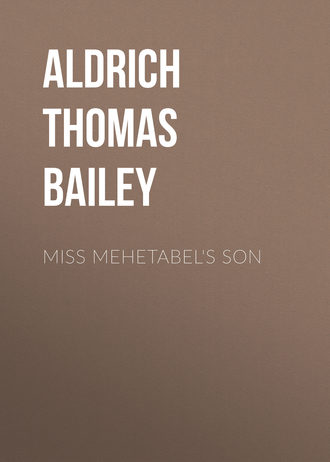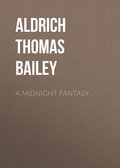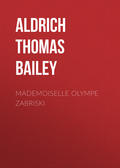
Aldrich Thomas Bailey
Miss Mehetabel's Son
Mr. Sewell set the candlestick on the mantel-shelf, and threw some pine-knots on the fire, which immediately broke into a blaze, and showed him to be a lank, narrow-chested man, past sixty, with sparse, steel-gray hair, and small, deep-set eyes, perfectly round, like a fish’s, and of no particular color. His chief personal characteristics seemed to be too much feet and not enough teeth. His sharply cut, but rather simple face, as he turned it towards me, wore a look of interrogation. I replied to his mute inquiry by taking out my pocket-book and handing him my business-card, which he held up to the candle and perused with great deliberation.
“You ‘re a civil engineer, are you?” he said, displaying his gums, which gave his countenance an expression of almost infantile innocence. He made no further audible remark, but mumbled between his thin lips something which an imaginative person might have construed into “If you ‘re at civil engineer, I ‘ll be blessed if I would n’t like to see an uncivil one!”
Mr. Sewell’s growl, however, was worse than his bite—owing to his lack of teeth probably—for he very good-naturedly set himself to work preparing supper for me. After a slice of cold ham, and a warm punch, to which my chilled condition gave a grateful flavor, I went to bed in a distant chamber in a most amiable mood, feeling satisfied that Jones was a donkey to bother himself about his identity.
When I awoke, the sun was several hours high. My bed faced a window, and by raising myself on one elbow I could look out on what I expected would be the main street. To my astonishment I beheld a lonely country road winding up a sterile hill and disappearing over the ridge. In a cornfield at the right of the road was a small private graveyard, enclosed by a crumbling stonewall with a red gate. The only thing suggestive of life was this little corner lot occupied by death. I got out of bed and went to the other window. There I had an uninterrupted view of twelve miles of open landscape, with Mount Agamenticus in the purple distance. Not a house or a spire in sight. “Well,” I exclaimed, “Greenton does n’t appear to be a very closely packed metropolis!” That rival hotel with which I had threatened Mr. Sewell overnight was not a deadly weapon, looking at it by daylight. “By Jove!” I reflected, “maybe I ‘m in the wrong place.” But there, tacked against a panel of the bedroom door, was a faded time-table dated Greenton, August 1, 1839.
I smiled all the time I was dressing, and went smiling down stairs, where I found Mr. Sewell, assisted by one of the fair sex in the first bloom of her eightieth year, serving breakfast for me on a small table—in the bar-room!
“I overslept myself this morning,” I remarked apologetically, “and I see that I am putting you to some trouble. In future, if you will have me called, I will take my meals at the usual table de hôte.”
“At the what?” said Mr. Sewell.
“I mean with the other boarders.”
Mr. Sewell paused in the act of lifting a chop from the fire, and, resting the point of his fork against the woodwork of the mantelpiece, grinned from ear to ear.
“Bless you! there is n’t any other boarders. There has n’t been anybody put up here sence—let me see—sence father-in-law died, and that was in the fall of ‘40. To be sure, there ‘s Silas; he’s a regular boarder; but I don’t count him.”
Mr. Sewell then explained how the tavern had lost its custom when the old stage line was broken up by the railroad. The introduction of steam was, in Mr. Sewell’s estimation, a fatal error. “Jest killed local business. Carried it off, I ‘m darned if I know where. The whole country has been sort o’ retrograding ever sence steam was invented.”
“You spoke of having one boarder,” I said.
“Silas? Yes; he come here the summer ‘Tilda died—she that was ‘Tilda Bayley—and he ‘s here yet, going on thirteen year. He could n’t live any longer with the old man. Between you and I, old Clem Jaffrey, Silas’s father, was a hard nut. Yes,” said Mr. Sewell, crooking his elbow in inimitable pantomime, “altogether too often. Found dead in the road hugging a three-gallon demijohn. Habeas corpus in the barn,” added Mr. Sewell, intending, I presume, to intimate that a post-mortem examination had been deemed necessary. “Silas,” he resumed, in that respectful tone which one should always adopt when speaking of capital, “is a man of considerable property; lives on his interest, and keeps a hoss and shay. He ‘s a great scholar, too, Silas; takes all the pe-ri-odicals and the Police Gazette regular.”
Mr. Sewell was turning over a third chop, when the door opened and a stoutish, middle-aged little gentleman, clad in deep black, stepped into the room.
“Silas Jaffrey,” said Mr. Sewell, with a comprehensive sweep of his arm, picking up me and the new-comer on one fork, so to speak. “Be acquainted!”
Mr. Jaffrey advanced briskly, and gave me his hand with unlooked-for cordiality. He was a dapper little man, with a head as round and nearly as bald as an orange, and not unlike an orange in complexion, either; he had twinkling gray eyes and a pronounced Roman nose, the numerous freckles upon which were deepened by his funereal dress-coat and trousers. He reminded me of Alfred de Musset’s blackbird, which, with its yellow beak and sombre plumage, looked like an undertaker eating an omelet.
“Silas will take care of you,” said Mr. Sewell, taking down his hat from a peg behind the door. “I ‘ve got the cattle to look after. Tell him, if you want anything.”
While I ate my breakfast, Mr. Jaffrey hopped up and down the narrow bar-room and chirped away as blithely as a bird on a cherry-bough, occasionally ruffling with his fingers a slight fringe of auburn hair which stood up pertly round his head and seemed to possess a luminous quality of its own.
“Don’t I find it a little slow up here at the Corners? Not at all, my dear sir. I am in the thick of life up here. So many interesting things going on all over the world—inventions, discoveries, spirits, railroad disasters, mysterious homicides. Poets, murderers, musicians, statesmen, distinguished travellers, prodigies of all kinds turning up everywhere. Very few events or persons escape me. I take six daily city papers, thirteen weekly journals, all the monthly magazines, and two quarterlies. I could not get along with less. I could n’t if you asked me. I never feel lonely. How can I, being on intimate terms, as it were, with thousands and thousands of people? There’s that young woman out West. What an entertaining creature she is!—now in Missouri, now in Indiana, and now in Minnesota, always on the go, and all the time shedding needles from various parts of her body as if she really enjoyed it! Then there ‘s that versatile patriarch who walks hundreds of miles and saws thousands of feet of wood, before breakfast, and shows no signs of giving out. Then there’s that remarkable, one may say that historical colored woman who knew Benjamin Franklin, and fought at the battle of Bunk—no, it is the old negro man who fought at Bunker Hill, a mere infant, of course, at that period. Really, now, it is quite curious to observe how that venerable female slave—formerly an African princess—is repeatedly dying in her hundred and eleventh year, and coming to life again punctually every six months in the small-type paragraphs. Are you aware, sir, that within the last twelve years no fewer than two hundred and eighty-seven of General Washington’s colored coachmen have died?”
For the soul of me I could not tell whether this quaint little gentleman was chaffing me or not. I laid down my knife and fork, and stared at him.
“Then there are the mathematicians!” he cried vivaciously, without waiting for a reply. “I take great interest in them. Hear this!” and Mr. Jaffrey drew a newspaper from a pocket in the tail of his coat, and read as follows: “It has been estimated that if all the candles manufactured by this eminent firm (Stearine & Co.) were placed end to end, they would reach 2 and 7/8 times around the globe. Of course,” continued Mr. Jaffrey, folding up the journal reflectively, “abstruse calculations of this kind are not, perhaps, of vital importance, but they indicate the intellectual activity of the age. Seriously, now,” he said, halting in front of the table, “what with books and papers and drives about the country, I do not find the days too long, though I seldom see any one, except when I go over to K– for my mail. Existence may be very full to a man who stands a little aside from the tumult and watches it with philosophic eye. Possibly he may see more of the battle than those who are in the midst of the action. Once I was struggling with the crowd, as eager and undaunted as the best; perhaps I should have been struggling still. Indeed, I know my life would have been very different now if I had married Mehetabel—if I had married Mehetabel.”







